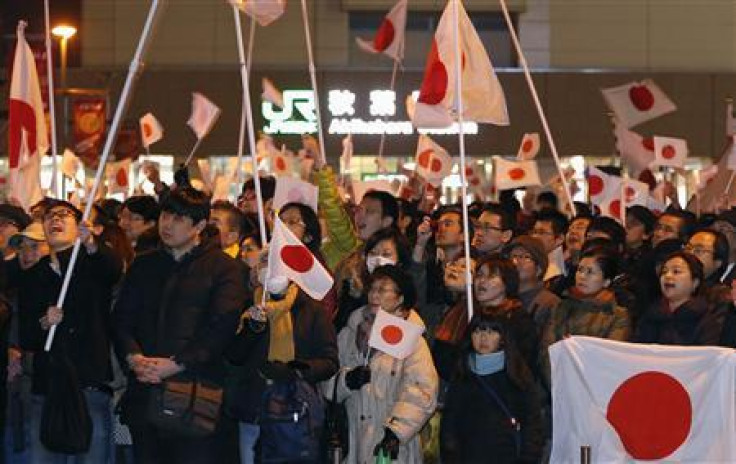Shinzo Abe And Conservative LDP Win Japan Election, With Implications For China Relations

The conservative Liberal Democratic Party of Shinzo Abe surged back to power in Japan's election Sunday just three years after a devastating defeat -- a right-wing victory that will usher in a government committed to a tough stance in a territorial row with China.
The LDP and its ally, the New Komeito Party, won a stable majority in the general election held Sunday, Japanese media reported.
A TV Asahi projection based on counted votes, reported by Reuters, gave the LDP at least 291 seats in parliament's 480-member lower house, and together with its small ally, the New Komeito party, a two-thirds majority needed to override, on most matters, the upper house, where no party has majority.
While LDP and New Komeito officials confirmed they would form a coalition, LDP Secretary-General Shigeru Ishiba did not rule out cooperation with the Japan Restoration Party, a new right-leaning party that was set to pick up at least 52 seats, Reuters reported.
"I think there is room to do this in the area of national defense," he said. The New Komeito is more moderate than the LDP on security issues.
The result has potentially far reaching implications for the world’s third-largest economy and its relations with China. It comes at a time when tensions between Japan and China over the disputed islands in the East China Sea -- known as Senkaku in Japan and Diaoyu in China -- have reached new heights.
On Thursday, Tokyo scrambled fighter jets and made a formal diplomatic protest after a Chinese maritime surveillance airplane was spotted in the territorial air space of the remote and uninhabited islands. The flight, which Tokyo’s Defense Ministry said was the first violation of Japan’s airspace by an official Chinese aircraft since at least 1958, came as China marked the 75th anniversary of the Nanjing massacre (or Rape of Nanking) -- one of the most notorious incidents in Japan’s 1937-45 invasion that is still a source of friction between Asia’s two leading powers.
In recent months, China has routinely sent surveillance ships into the territorial waters around the disputed islands, claiming the islands are part of its sovereign territory, having been wrongfully stolen by Japanese military expansions in the late 19th century. On Friday, China provided the United Nations with detailed claims to waters in the East China Sea.
Hours before the polls in Japan closed, Xinhua, China’s state-run news agency, was already warning about a nationalistic trend among Japan’s politicians that could worsen ties with neighbors, threatening economic relationships and regional stability.
“It is a troubling sign that some of the political parties vying for the 480 seats of Japan’s lower house of the parliament have pledged to take a tough stance on territorial disputes and boost military spending to woo rightist voters,” Xinhua said in a commentary published Sunday.
The commentary called on the incoming leadership to "devise its foreign policy with a long-term and pragmatic" view so Japan can "repair its strained ties with neighbors."
“Japan, which brought great harm and devastation to other Asian countries in the World War II, will raise further suspicions among its neighbors if the current political trend of turning right is not stopped in time,” the commentary warned. “It will be a wise move if the Japanese leaders reiterate the pacifist path adopted by the country after the Second World War and stay away from the notorious and highly controversial Yasukuni Shrine, which honored WWII war criminals among the war dead.”
Abe, 58, who quit as premier in 2007 citing ill health after a troubled year in office, has paid respects to Japan’s war dead -- including leading war criminals -- at the controversial Yasukuni Shrine, though he has not yet said whether he would visit as prime minister.
He a vocal advocate of the rewriting Japan’s postwar pacifistic constitution to allow it to emerge as a full regional military power.
"I have not changed my view from five years ago when I was prime minister that the biggest issue for Japan is truly 'escaping the post-war regime'," Abe wrote in a recent magazine article. "Haven't we put off problems without clarifying Japan's will to protect the lives and assets of its people and territory with its own hands, and merely accepted the benefits of economic prosperity?”
Japan’s pacifist constitution, written under American supervision in the aftermath of World War II, prohibits an act of war by the state. The military is officially called the "self-defense force."
Article 9 of the Japanese Constitution provides:
“Aspiring sincerely to an international peace based on justice and order, the Japanese people forever renounce war as a sovereign right of the nation and the threat or use of force as means of settling international disputes. (2) To accomplish the aim of the preceding paragraph, land, sea, and air forces, as well as other war potential, will never be maintained. The right of belligerency of the state will not be recognized.”
Implementation of Article 9 has resulted in Japan having a secondary role in military balance in the region. But despite its constitutional limitations, Japan’s defense budget is the sixth-largest in the world.
© Copyright IBTimes 2024. All rights reserved.












